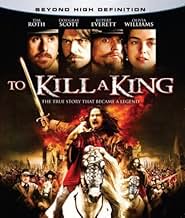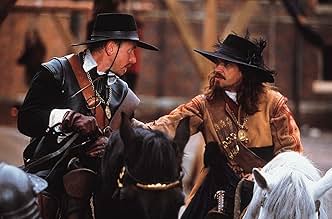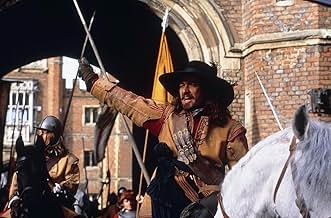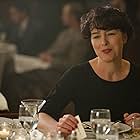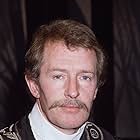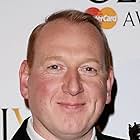IMDb RATING
6.2/10
3.5K
YOUR RATING
A recounting of the relationship between General Fairfax and Oliver Cromwell, as they try to cope with the consequences of deposing King Charles I.A recounting of the relationship between General Fairfax and Oliver Cromwell, as they try to cope with the consequences of deposing King Charles I.A recounting of the relationship between General Fairfax and Oliver Cromwell, as they try to cope with the consequences of deposing King Charles I.
- Nominated for 1 BAFTA Award
- 3 nominations total
- Director
- Writer
- All cast & crew
- Production, box office & more at IMDbPro
Storyline
Did you know
- TriviaThe execution of King Charles I was filmed on the exact same day the actual execution took place some 300 years earlier.
- GoofsIn the opening sequence, Fairfax shoots the sword out of the hand of Cromwell's assassin with a flintlock pistol at about 30 yards range. Such pistols had no rifling at that period and were incapable of nowhere near such accuracy, even in the hands of an expert. To shoot at that range Fairfax would have been more likely to have hit the assassin. Also the bullet struck sparks from the sword hilt when it hit. This is impossible as the bullet would have been a soft lead ball and incapable of creating a spark.
- Quotes
Denzil Holles: At last we all can sleep soundly, knowing that for once the King cannot impose a new tax on us in the morning.
Sir Thomas Fairfax: You make it sound as if you fought the war only to save your profits, Holles!
Featured review
Although it presents endless possibilities for costume, action, and worthy 'English' performances, the English Civil War is not a fertile inspiration for films. It has, of course, featured as wallpaper in the 'bodice ripping' genre -'The Scarlet Blade' and 'The Moonraker'come to mind. It also provided the context for the excellent 'Witchfinder General', and the little known and undervalued 'Winstanley'. But there is only one film that comes anywhere near depicting the great and complex panoramic sweep of this period - 'Cromwell'.
I have to tell you that there still is.....for 'To Kill a King' corresponds to that animal most associated with the Puritans across the Atlantic. In short, it's a turkey. Oh, it could have amounted to something, for the ingredients are there if you look hard enough. But it would have helped if the scriptwriters and the director took time out to...well...read a history book.
Now, at this very moment, no doubt, dozens of people will immediately jump out of the woodwork and say 'but it's meant to be entertainment, not a historical documentary!' True enough, and as the credits say at the end, certain events have been altered for dramatic effect. I've no argument with that. If it had kept some sense of proportion, as in 'Michael Collins' (or 'Cromwell' for that matter) I would rest easy. But this film throws out the baby with the bathwater.
The whole of the civil war is reduced to a backdrop for an angst-ridden relationship. There is absolutely no-one else (apart from a pantomine villain) on the whole parliamentarian side, save Cromwell and Fairfax. It's like a seventeenth century version of Cameron's 'Titanic' without the special effects. The mutinous army? The Leveller 'agitators'? The Independent leaders? Not a sign of them! No, Cromwell and Fairfax call all the shots, have the king arrrested etc. etc.
Ah, you say, but that clears the ground for some fine characterisation and acting. Well....not really. You see, the characters of Cromwell and Charles I are absolutely fascinating, and we know so much about them from contemporary sources. In fact, much more interesting than what we get on the screen. The man who desperately wanted a constitutional settlement with the king; who was tolerant of divergent views; and ended up using the army to curb the tyrannical tendencies of the Presbyterian faction of Parliament (an amazing irony, if ever there was one), is depicted as a kind of seventeenth century Trotskyite, the kind of person trying to sell you 'Socialist Worker', complete with the glazed eyes. The man who was devoted to his family, liked music, and loved practical jokes, is played as a humourlous monomaniac. In short, Tim Roth's Cromwell verges on charicature.(At one point, I thought that he had turned into Clint Eastwood's 'Man With No Name', but it could have been the hat.)
Dougray Scott, as Fairfax, is the best thing in it - at least he seems half way believable (though not as a Yorkshireman). Charles I is something else. The real one was refined, courteous, and chaste. Presumably, Rupert Everett must have realised this, as it is evident that he put some time in watching the superb performance by Alec Guiness. (You can almost hear him thinking...'oh..it's about time that I stuttered again!') However this Charles is without charm - slapping his guard, sneering, and flirting with Fairfax's wife.... And then there is Denzil Holles. James Bolan does not appear that enthusiatic - in fact, he almost telephones his lines in.
On a positive note, the film has some moments that are unintentially hilarious. Charles accompanies Mrs. Fairfax on the virginals(?) as she gives a rendering of 'It was a Lover and His Lass'. Cromwell bursts in and starts heaving the furniture around just as they get to the 'hey nonny noes'. We later cut to the Tower of London for some curiously linked vignettes. After a torture session, one of Cromwell's guards hacks off a head for his master's delectation. Charles's Death Warrant is being signed before the trial by this evil lot. All this is done to the accompaniment of a choir of black gowned puritans chanting....no, not a jingle for Quaker Oats, but some strange dirge that is meant to symbolise ascetic intolerance. Yes, folks, nearly all the parliamentarians are sponsored by the breakfast food. Not only is this costume inaccurate, but it's slipshod and boring. After a reconciliation invoving some male bonding, Cromwell suggests Fairfax join him in invading Scotland in the same tone that a mate might propose calling for a curry after the pub shuts.
What else? Did you know that Cromwell pistolled street vendors of Charles I memorabilia? That he wasn't really a General until the war was over?
I'm not really sure who, exactly,this film is aimed at. It won't have the resonance of hokum like 'Braveheart' or 'The Patriot', for the text exposition at the start curves across the screen like battlesmoke. It doesn't have much in the way of action or sex. There aren't any fine dramatic performances. So what on earth were they trying to do?
I have to tell you that there still is.....for 'To Kill a King' corresponds to that animal most associated with the Puritans across the Atlantic. In short, it's a turkey. Oh, it could have amounted to something, for the ingredients are there if you look hard enough. But it would have helped if the scriptwriters and the director took time out to...well...read a history book.
Now, at this very moment, no doubt, dozens of people will immediately jump out of the woodwork and say 'but it's meant to be entertainment, not a historical documentary!' True enough, and as the credits say at the end, certain events have been altered for dramatic effect. I've no argument with that. If it had kept some sense of proportion, as in 'Michael Collins' (or 'Cromwell' for that matter) I would rest easy. But this film throws out the baby with the bathwater.
The whole of the civil war is reduced to a backdrop for an angst-ridden relationship. There is absolutely no-one else (apart from a pantomine villain) on the whole parliamentarian side, save Cromwell and Fairfax. It's like a seventeenth century version of Cameron's 'Titanic' without the special effects. The mutinous army? The Leveller 'agitators'? The Independent leaders? Not a sign of them! No, Cromwell and Fairfax call all the shots, have the king arrrested etc. etc.
Ah, you say, but that clears the ground for some fine characterisation and acting. Well....not really. You see, the characters of Cromwell and Charles I are absolutely fascinating, and we know so much about them from contemporary sources. In fact, much more interesting than what we get on the screen. The man who desperately wanted a constitutional settlement with the king; who was tolerant of divergent views; and ended up using the army to curb the tyrannical tendencies of the Presbyterian faction of Parliament (an amazing irony, if ever there was one), is depicted as a kind of seventeenth century Trotskyite, the kind of person trying to sell you 'Socialist Worker', complete with the glazed eyes. The man who was devoted to his family, liked music, and loved practical jokes, is played as a humourlous monomaniac. In short, Tim Roth's Cromwell verges on charicature.(At one point, I thought that he had turned into Clint Eastwood's 'Man With No Name', but it could have been the hat.)
Dougray Scott, as Fairfax, is the best thing in it - at least he seems half way believable (though not as a Yorkshireman). Charles I is something else. The real one was refined, courteous, and chaste. Presumably, Rupert Everett must have realised this, as it is evident that he put some time in watching the superb performance by Alec Guiness. (You can almost hear him thinking...'oh..it's about time that I stuttered again!') However this Charles is without charm - slapping his guard, sneering, and flirting with Fairfax's wife.... And then there is Denzil Holles. James Bolan does not appear that enthusiatic - in fact, he almost telephones his lines in.
On a positive note, the film has some moments that are unintentially hilarious. Charles accompanies Mrs. Fairfax on the virginals(?) as she gives a rendering of 'It was a Lover and His Lass'. Cromwell bursts in and starts heaving the furniture around just as they get to the 'hey nonny noes'. We later cut to the Tower of London for some curiously linked vignettes. After a torture session, one of Cromwell's guards hacks off a head for his master's delectation. Charles's Death Warrant is being signed before the trial by this evil lot. All this is done to the accompaniment of a choir of black gowned puritans chanting....no, not a jingle for Quaker Oats, but some strange dirge that is meant to symbolise ascetic intolerance. Yes, folks, nearly all the parliamentarians are sponsored by the breakfast food. Not only is this costume inaccurate, but it's slipshod and boring. After a reconciliation invoving some male bonding, Cromwell suggests Fairfax join him in invading Scotland in the same tone that a mate might propose calling for a curry after the pub shuts.
What else? Did you know that Cromwell pistolled street vendors of Charles I memorabilia? That he wasn't really a General until the war was over?
I'm not really sure who, exactly,this film is aimed at. It won't have the resonance of hokum like 'Braveheart' or 'The Patriot', for the text exposition at the start curves across the screen like battlesmoke. It doesn't have much in the way of action or sex. There aren't any fine dramatic performances. So what on earth were they trying to do?
- How long is To Kill a King?Powered by Alexa
Details
Box office
- Budget
- $14,300,000 (estimated)
- Gross worldwide
- $567,471
- Runtime1 hour 42 minutes
- Color
- Sound mix
- Aspect ratio
- 2.35 : 1
Contribute to this page
Suggest an edit or add missing content



